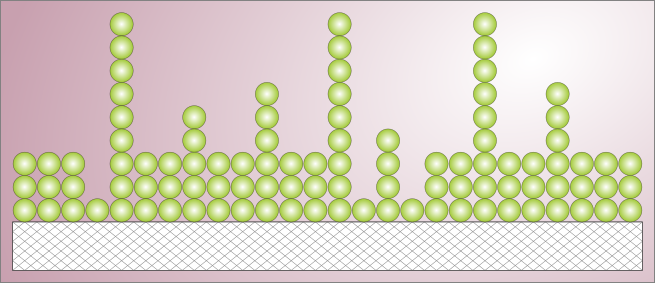-
Adsorption
Adsorption is the adhesion of atoms, ions or molecules from a gas, liquid or dissolved solid to a surface. This process creates a film of the adsorbate on the surface of the adsorbent. This process differs from absorption, in which a fluid (the absorbate) is dissolved by or permeates a liquid or solid (the absorbent), respectively. Adsorption is a surface phenomenon, while absorption involves the whole volume of the material. The term sorption encompasses both processes, while desorption is the reverse of it.
Similar to surface tension, adsorption is a consequence of surface energy. In a bulk material, all the bonding requirements (be they ionic, covalent or metallic) of the constituent atoms of the material are filled by other atoms in the material. However, atoms on the surface of the adsorbent are not wholly surrounded by other adsorbent atoms and therefore can attract adsorbates. The exact nature of the bonding depends on the details of the species involved, but the adsorption process is generally classified as physisorption (characteristic of weak van der Waals forces) or chemisorption (characteristic of covalent bonding). It may also occur due to electrostatic attraction.Adsorption is present in many natural, physical, biological and chemical systems and is widely used in industrial applications such as heterogeneous catalysts, activated charcoal, capturing and using waste heat to provide cold water for air conditioning and other process requirements (adsorption chillers), synthetic resins, increasing storage capacity of carbide-derived carbons and water purification. Adsorption, ion exchange and chromatography are sorption processes in which certain adsorbates are selectively transferred from the fluid phase to the surface of insoluble, rigid particles suspended in a vessel or packed in a column. Pharmaceutical industry applications, which use adsorption as a means to prolong neurological exposure to specific drugs or parts thereof, are lesser known.
The word “adsorption” was coined in 1881 by German physicist Heinrich Kayser (1853–1940).
-
Absorption (noun)
The act or process of absorbing or of being absorbed as,
-
Absorption (noun)
engulfing; swallowing up, as of bodies or land. Attested from the late 16th century until the mid 18th century.page=9
-
Absorption (noun)
assimilate; incorporation. First attested in the mid 18th century.
“the absorption of a smaller tribe into a larger”
“the absorption of bodies in a whirlpool”
-
Absorption (noun)
the imbibing or reception by molecular or chemical action, of radiant energy; the process of being neutrons being absorbed by the nucleus; interception. First attested in the mid 18th century.
“the absorption of light, heat, electricity, etc.”
-
Absorption (noun)
Entire engrossment or occupation of the mind. First attested in the mid 19th century.
“absorption in some employment””
-
Absorption (noun)
Mental assimilation. First attested in the mid 20th century.
-
Absorption (noun)
The retaining of electrical energy for a short time after it has been introduced to the dielectric.
-
Adsorption (noun)
The adhesion of a liquid or gas on the surface of a solid material, forming a thin film on the surface.

